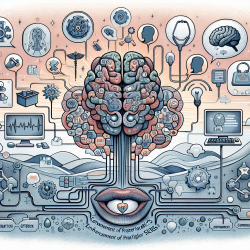Introduction
In the realm of speech-language pathology and online therapy, practitioners often face the challenge of managing vast amounts of information while ensuring effective communication with their clients. The research article "The Human Interface of Biomedical Informatics" provides valuable insights into how cognitive informatics can be leveraged to enhance practitioner skills, particularly in the context of online therapy services like those offered by TinyEYE.
Understanding Cognitive Processing
The human brain's capacity for processing new information is finite, constrained by the rate-limited processes of neuronal synapse formation and protein synthesis. Practitioners can benefit from understanding these constraints to optimize information delivery and enhance cognitive processing in their practice.
- Short-term working memory is limited to processing no more than 4 separate informational items simultaneously.
- Long-term memory, however, can provide immediate access to multiple informational items, making it a valuable asset in therapy sessions.
- Visual aids can enhance long-term memory retention, suggesting the use of visual tools in online therapy sessions.
Managing Cognitive Load
Practitioners must be mindful of cognitive load, which can be managed by breaking down complex tasks into simpler, more manageable components. This approach not only facilitates learning but also ensures that clients are not overwhelmed by information.
- Intrinsic load can be reduced by simplifying tasks and focusing on one element at a time.
- Extraneous load, often increased by multitasking, can be minimized by creating structured therapy sessions with clear objectives.
Addressing Stress and Cognitive Bias
Stress and cognitive bias can significantly impact memory storage and retrieval, affecting the quality of therapy sessions. Practitioners can implement strategies to mitigate these effects, such as:
- Maintaining a calm and supportive environment to reduce stress-induced memory impairments.
- Being aware of personal biases that may influence information processing and decision-making.
Enhancing Communication and Reducing Distractions
Effective communication is crucial in therapy. Practitioners should strive to ensure that information transfer is as congruent as possible, utilizing visual aids to enhance retention. Additionally, minimizing distractions, such as background noise, can improve the focus and effectiveness of therapy sessions.
Conclusion
By integrating the principles of cognitive informatics into their practice, practitioners can enhance their skills, leading to improved outcomes for their clients. The insights from the research article "The Human Interface of Biomedical Informatics" provide a foundation for further exploration and implementation of these strategies.
To read the original research paper, please follow this link: The Human Interface of Biomedical Informatics.










